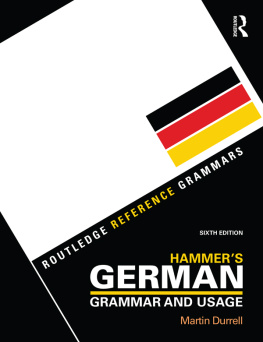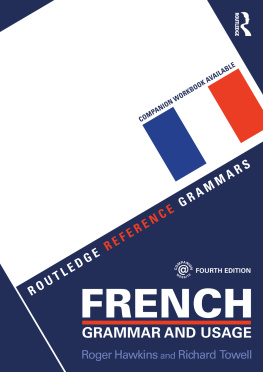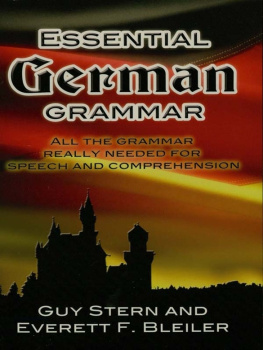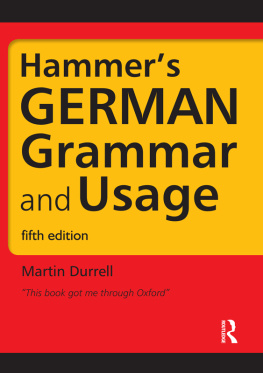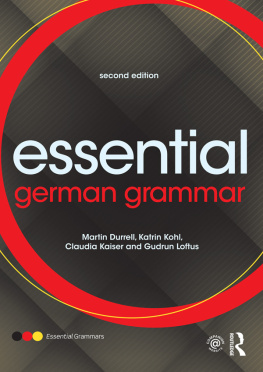Sixth edition published 2017
by Routledge
2 Park Square, Milton Park, Abingdon, Oxon OX14 4RN
and by Routledge
711 Third Avenue, New York, NY 10017
Routledge is an imprint of the Taylor & Francis Group, an informa business
Copyright 1971 and 1983 the estate of A.E. Hammer
Revisions for the second edition 1991 Arnold
Revisions for the third edition 1996 Arnold
Revisions for the fourth edition 2002 Arnold
Revisions for the fifth edition 2011 Taylor & Francis
Revisions for the sixth edition 2017 Taylor & Francis
All rights reserved. No part of this book may be reprinted or reproduced or utilised in any form or by any electronic, mechanical, or other means, now known or hereafter invented, including photocopying and recording, or in any information storage or retrieval system, without permission in writing from the publishers.
Trademark notice: Product or corporate names may be trademarks or registered trademarks, and are used only for identification and explanation without intent to infringe.
British Library Cataloguing-in-Publication Data
A catalogue record for this book is available from the British Library
Library of Congress Cataloging-in-Publication Data
Names: Durrell, Martin, author. | Hammer, A. E. (Alfred Edward). German
grammar and usage.
Title: Hammers German grammar and usage / Martin Durrell.
Description: Sixth edition. | Abingdon, Oxon ; New York, NY : Routledge,
2016. | Series: Routledge reference grammars | Includes bibliographical
references and index.
Identifiers: LCCN 2016020498| ISBN 9781138853720 (hardback : alk. paper) |
ISBN 9781138853713 (pbk. : alk. paper) | ISBN 9781315722634 (ebook)
Subjects: LCSH: German language--Grammar. | German language--Textbooks
for foreign speakers--English. | German language--Usage.
Classification: LCC PF3112 .D77 2016 | DDC 438.2421--dc23
LC record available at https://lccn.loc.gov/2016020498
ISBN: 978-1-138-85372-0 (hbk)
ISBN: 978-1-138-85371-3 (pbk)
ISBN: 978-1-315-72263-4 (ebk)
Typeset in Univers and Palatino
by Saxon Graphics Ltd, Derby

Routledge Reference Grammars
Also available in this series:
French Grammar and Usage, Fourth Edition
A Reference Grammar of Modern Italian, Second Edition
A New Reference Grammar of Modern Spanish, Fifth Edition
Companion workbooks available to purchase separately:
Practising French Grammar, Fourth Edition
Practising German Grammar, Fourth Edition
Practising Italian Grammar
Practising Spanish Grammar, Third Edition
Verbs: valency
Different verbs need different elements to make a grammatical sentence . The elements which a particular verb needs to form a grammatical sentence are called the COMPLEMENTS of the verb, and the type and number of complements required by a particular verb to construct a grammatical sentence make up the VALENCY of the verb.
In particular, German typically shows the relationship between the complements and the verb by using cases (see ).
The various sections of this chapter explain the valency and the complements of verbs, with particular emphasis on verbs and constructions in German which are different from their nearest English equivalents.
verb valency , complements and sentence patterns (section 16.1 )
the subject of the verb (section 16.2 )
the accusative or direct object of the verb (section 16.3 )
verb objects in the dative case (section 16.4 )
prepositional objects (section 16.5 )
predicate complements (section 16.6 )
verb objects in the genitive case (section 16.7 )
locative complements (section 16.8 )
16.1.1 The complements of the verb
The complements of a particular verb are the elements it needs to construct a grammatical sentence. Different verbs need different elements the action of giving, for instance, involves a person handing a thing over to another person. The verb geben , therefore, needs three elements to form a sentence: a SUBJECT (in the nominative case), a DIRECT OBJECT (in the accusative case) and an INDIRECT OBJECT (in the dative case):
Mein Vater (nom.) hat seinem Bruder (dat.) doch das Geld (acc.) gegeben
If we omitted any of these, the sentence would be ungrammatical. Other verbs, like telefonieren , only need one element, in this case a subject :
Ich habe eben telefoniert Ive just made a phone call
Many verbs, like schlagen , need two, i.e. a subject and a direct object :
Sie hat den Ball geschlagen She hit the ball
Some verbs have other types of construction, for example with a subject and a phrase with a particular preposition (a prepositional object ), like warten :
Ich habe lange auf dich gewartet I waited a long time for you
There are seven types of complement in German , as shown in . The most important is the subject , which all but a few verbs must have and which is dealt with in 16.2 . Full details about the other complements are given in sections 16.316.8 .
Verb complements in German
| subject | a noun phrase in the nominative case | Der Bcker trinkt zu viel
Hier wchst ein guter Wein
Das hast du mir doch versprochen! |
| accusative object | a noun phrase in the accusative case | Er trinkt schwarzen Tee
Sie hat mir diesen Roman empfohlen
Diesen Mann sah er in der Stadt |
| dative object | a noun phrase in the dative case | Sie verkaufte mir einen Laptop
Ich habe soben Markus gemailt
Ihrem Mann wollte ich helfen |
| genitive object | a noun phrase in the genitive case | Er bedarf meiner Hilfe
Er erinnerte sich des Vorfalls
Sie wurde des Mordes angeklagt |
| prepositional object | a phrase introduced by a preposition determined by the verb | Sie warnte mich vor dem Polizisten
Er starb an einer Lungenentzndung
Darauf hatte sie lange gewartet |
| locative complement | a phrase indicating place with a verb of position or direction with a verb of motion | Sie wohnt in Heiligenhafen
Gestern ist sie in die Stadt gefahren
Er legte das Buch auf den Tisch |
| predicate complement | a noun phrase in the nominative case or an adjective with a copular verb | Er ist ihr Betreuer
Wir sind lter geworden
Das Heft war teuer |
16.1.2 Verb valency
Every German verb GOVERNS a specific number of complements of a particular type. geben , for instance, as in the example in 16.1.1 , has three: a subject , an accusative or direct object and a dative or indirect object , whereas telefonieren has only a subject. The property of each verb to govern a certain number of complements of a particular type is the VALENCY of the verb.
We have to know the valency of a German verb to be able to use it correctly. This is sometimes different from the valency of what may seem to be the equivalent English verb:
Das hat er mir gestern mitgeteilt
Ich frchte mich vor dem Zahnarzt
Er riet ihr von dieser Reise ab | He informed me of that yesterday
Im afraid of the dentist
He advised her against (making) this journey |
English-speaking learners need to learn the valency of each verb carefully in order to be able to use it in context. It is good practice to learn German verbs in typical sentences containing them.

